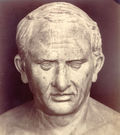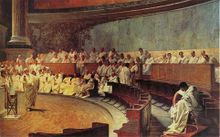Cicero
 From Conservapedia
From Conservapedia Cicero (106-43 BC) (full name Marcus Tullius Cicero) was a Roman consul, orator, statesman, lawyer, philosopher, and academic skeptic, as well as being a prolific writer of books. In the time after the assassination of Julius Caesar, Cicero became one of the most powerful politicians in Rome, and a rival to Mark Antony. Cicero's attempts to rid himself of Antony failed, leading to Cicero's death while fleeing the Roman heartland due to the alliance of Antony and Octavian. What is particularly spectacular about Cicero is that he was a 'new man'. At that time, the Senate was dominated by the same old, noble families, who were often prejudiced against what they viewed as new, unexperienced upstarts. Cicero, despite being from a poor unknown family, managed to attain the rank of consul, the highest rank in the Republic at that time.
Contents
Rhetoric[edit]
Cicero is considered to be one of the greatest orators and speech writers the world has ever known and a father to modern legalists and barristers. He had an enormous influence on European thought, 1500-1900, and on American thought, 1770-1900.
Philosophy[edit]
Cicero’s philosophical works were core texts in the traditional Latin-based liberal arts curriculum. His ethical and political texts include De Officiis, De Finibus Bonorum et Malorum, De Re Publica, and De Legibus. De Officiis, On Duties, was a standard text on ethics read by every educated student prior to the 19th century. It was treasured by scholars and theologians including St. Ambrose, St. Augustine, St. Jerome, and Thomas Aquinas. It was championed by Petrarch, Erasmus, Grotius, Locke, Hume, Jefferson, John Adams, and James Wilson. Cicero was a staunch defender of property rights, natural law, and republican values.
Roman politics[edit]
Cicero was also responsible for unveiling a plot to overthrow the Republic, and his consulship in particular, masterminded by Catiline among others. In his defeat of the conspirators, however, he set a dangerous precedent; he allowed the conspirators captured in the city of Rome to be executed without a trial. Caesar, among others, was reported to have argued against this by the historian Sallust. Later, during the tumultuous years near the end of the republic, Cicero was ultimately forced to support either Augustus or Mark Anthony. He chose to support Augustus, but after he and Mark Anthony allied together, one of their first decisions was to have Cicero eliminated. According to Sallust, the death of Cicero marked the end of the Roman Republic and the beginning of the Roman Empire. [Who says?]
Impact on America[edit]
The Founding Fathers studied Cicero in terms both of his rhetorical strategies and his commitment to Republicanism. John Adams in a 1775 series of newspaper articles, employed a rhetorical strategy reminiscent of Cicero in his orations against the conspiracy of Catiline, who plotted the overthrow of Rome. Writing under the name "Novanglus" in response to an eloquent Tory writer, Adams narrated a sweeping tale of conspiracy by Tories and British ministers to rob Massachusetts citizens of their rights and tax them unfairly. In his political letters as a member of the Continental Congress, Adams consciously used Cicero as a model for his style. Cicero's simple, familiar approach matched Adams's desire for his letters to be conversational in tone. This style itself permitted Adams to ponder and explore political issues and reach political judgments. Adams, like Cicero, used his letters to deliberate on important public matters.[1] John Quincy Adams remained inspired by classical rhetorical ideals long after the neo-classicalism and deferential politics of the founding generation had been eclipsed by the commercial ethos and mass democracy of the Jacksonian Era. Many of Adams's idiosyncratic positions were rooted in his abiding devotion to the Ciceronian ideal of the citizen-orator "speaking well" to promote the welfare of the polis.[2] Cicero remained influential in the 19th century; his life and works were taught in schools and his life was evaluated in popular biographies. Russell Kirk argues that Edmund Burke's "natural rights" concept owes more to Cicero than Locke.[3]
Selected Works of Cicero[edit]
- De Oratore
- In Catilinam
- Brutus
- De Inventione
- De Re Publica
- De officiis
- De Legibus
Quotes of Cicero[edit]
"Where is there dignity unless there is honesty?" - Cicero
"Nature herself has imprinted upon the minds of all, the idea of God." - Cicero
"The man in an administrative office, however, must make it his first care that everyone shall have what belongs to him and that private citizens suffer no invasion of their property rights by act of the state." - Cicero, De Officiis
"There is a true law, a right reason, conformable to nature, universal, unchangeable, eternal, whose commands urge us to duty, and whose prohibitions restrain us from evil. Whether it enjoins or forbids, the good respect its injunctions, and the wicked treat them with indifference. This law cannot be contradicted by any other law, and is not liable either to derogation or abrogation. Neither the senate nor the people can give us any dispensation for not obeying this universal law of justice. It needs no other expositor and interpreter than our own conscience. It is not one thing at Rome and another at Athens; one thing today and another tomorrow; but in all times and nations this universal law must for ever reign, eternal and imperishable. It is the sovereign master and emperor of all beings. God himself is its author, - its promulgator, - its enforcer. He who obeys it not, flies from himself, and does violence to the very nature of man. For his crime he must endure the severest penalties hereafter, even if he avoid the usual misfortunes of the present life." - Cicero, De Re Publica[4][5][6]
Fake quotes[edit]
"The budget should be balanced, the Treasury should be refilled, public debt should be reduced, the arrogance of officialdom should be tempered and controlled, and the assistance to foreign lands should be curtailed lest Rome become bankrupt. People must again learn to work, instead of living on public assistance."[7]
"A nation can survive its fools, and even the ambitious. But it cannot survive treason from within. An enemy at the gates is less formidable, for he is known and carries his banner openly. But the traitor moves amongst those within the gate freely, his sly whispers rustling through all the alleys, heard in the very halls of government itself. For the traitor appears not a traitor; he speaks in accents familiar to his victims, and he wears their face and their arguments, he appeals to the baseness that lies deep in the hearts of all men. He rots the soul of a nation, he works secretly and unknown in the night to undermine the pillars of the city, he infects the body politic so that it can no longer resist. A murderer is less to be feared. The traitor is the carrier of the plague. You have unbarred the gates of Rome to him."
Further reading[edit]
- May, James M. Brill's Companion to Cicero: Oratory and Rhetoric. (2002), 632pp online edition
- online books on Cicero
References[edit]
- ↑ James M. Farrell, "Letters and Political Judgment: John Adams and Cicero's Style." Studies in Eighteenth Century Culture 1995 24: 137-153
- ↑ Lyon Rathbun, "The Ciceronian Rhetoric of John Quincy Adams." Rhetorica 2000 18(2): 175-215
- ↑ Russell Kirk. The Conservative Mind: From Burke to Eliot, 7th revised.
- ↑ Marcus Tullius Cicero. The Republic and the Laws.
- ↑ Marcus Tullius Cicero (1841). The political works of Marcus Tullius Cicero, tr. by Francis Barham.
- ↑ Ben W. Palmer. ABA Journal Nov 1959. “True law is right reason and in agreement with nature; it is of universal application, unchanging and everlasting; it summons to duty by its commands, and averts from wrongdoing by its prohibitions. And it does not lay its commands or prohibitions upon good men in vain, though neither have any effect on the wicked ... We cannot be freed from its obligations by senate or people, and we need not look outside ourselves for an expounder or interpreter. And there will not be different laws at Rome and at Athens, or different laws now and in the future, but one eternal and unchangeable law will be valid for all nations and all times, and there will be one master and ruler, that is, God, over us all, for He is the Author of this Law, its Promulgator, and its enforcing Judge. Whoever is disobedient is fleeing from himself and denying his human nature, and by reason of this very fact, he will suffer the worst penalties, even if he escapes what is commonly considered punishment.”
- ↑
- 1 It's a fake quote that was invented by a newspaper in 1986. Paul F. Boller and John George, They Never Said It: A Book of Fake Quotes, Misquotes, and Misleading Attributions (1990) p. 14
- 2 In 1968, a slight variation on this quote is attributed to Cicero by Congressman Passman in the Congressional Record url=http://www.archive.org/stream/congressionalrec114dunit#page/n631/mode/1up
External links[edit]
| |||||||||||
Categories: [Philosophers] [Romans] [Orators] [Republicanism] [Conservatives]
↧ Download as ZWI file | Last modified: 02/14/2023 03:21:23 | 73 views
☰ Source: https://www.conservapedia.com/Cicero | License: CC BY-SA 3.0
 ZWI signed:
ZWI signed:

 KSF
KSF